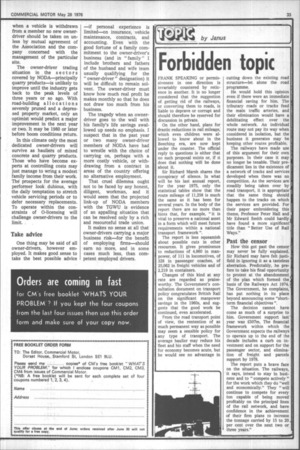Forbidden topic
Page 35

If you've noticed an error in this article please click here to report it so we can fix it.
FRANK SPEAKING or permissiveness in one direction is invariably countered by reticence in another. It is no longer considered that the suggestion of. getting rid of the railways, or converting them to roads, is liable to deprave or corrupt and should therefore be reserved for discussion in private.
On the other hand, plans for drastic reductions in rail mileage, which even children were allowed to know about in the Beeching era, are now kept under the counter. The official reply to questions is either that no such proposal exists or, if it does that nothing will be done about it,
Sir Richard Marsh shares the conspiracy of silence. In what will be his last annual report, for the year 1975, only the statistical tables show that the route mileage of 11,258 is much the same as it has been for several years. In the body of the report there are no more than hints that, for example, "it is vital to preserve a national asset in a form which will meet future requirements within a national transport framework ".
The report is less squeamish about possible cuts in other resources. It gives prominence to reductions of 4,960 in manpower, of 111 in locomotives, of 328 in passenger coaches, of 25,062 in freight vehicles and of 2,219 in containers.
Changes of this kind at any rate are regarded as praiseworthy. The Government's consultation document on transport policy congratulates British Rail on the significant manpower savings in the 1960s, and suggests that the good work be continued, even accelerated.
From the road transport point of view, the rentention of as much permanent way as possible may seem a sensible policy for any type of transport. The average haulier may reduce his fleet and his staff when the need for economy becomes acute, but he would see no advantage in cutting down the existing road structure—let alone the road programme.
He would hold this opinion even if there were an immediate financial saving for him. The tributary roads or tracks feed the main traffic arteries, and their elimination would have a debilitating effect over the whole network, An individual route may not pay its way when considered in isolation, but the business it generates may he keeping other routes profitable.
The railways have made use of this argument for their own purposes. In their case it may no longer be tenable. Their predicament lies in the existence of a network of tracks and services developed when there was no competition. As the services are I
steadily being taken over by road transport, it is appropriate that the same thing should happen to the tracks on which the services are provided. For their paper embroidering this theme, Professor Peter Hall and Mr Edward Smith could hardly have found a more significant title than "Better Use of Rail Ways."
Past the censor
How this got past the censor may never be fully explained. Sir Richard may have felt justifield in ignoring it as a tasteless aberration. Predictably, he prefers to take his final opportunity to protest at the abandonment of the plan which formed the basis of the Railways Act 1974. The Government, he complains, has put nothing in its place beyond announcing some "shortterm financial objectives ".
The decision cannot have come as much of a surprise to him. Government support last' year was £507m. The financial framework within which the Government expects the railways to operate up to 'the end of the decade includes a curb on investment and on support for the passenger sector, and elimination of freight and parcels support by 1978.
The report puts a brave face on the situation. The railways, it says, intend to stay in business and to "compete actively" for the work which they do "well and economically." They "will continue to compete for every ton capable of being moved profitably on the principal lines of the rail network, and have confidence in the achievement of their firm plans to increase the tonnage carried by 15 to 20 per cent over the next two or three years."




















































































